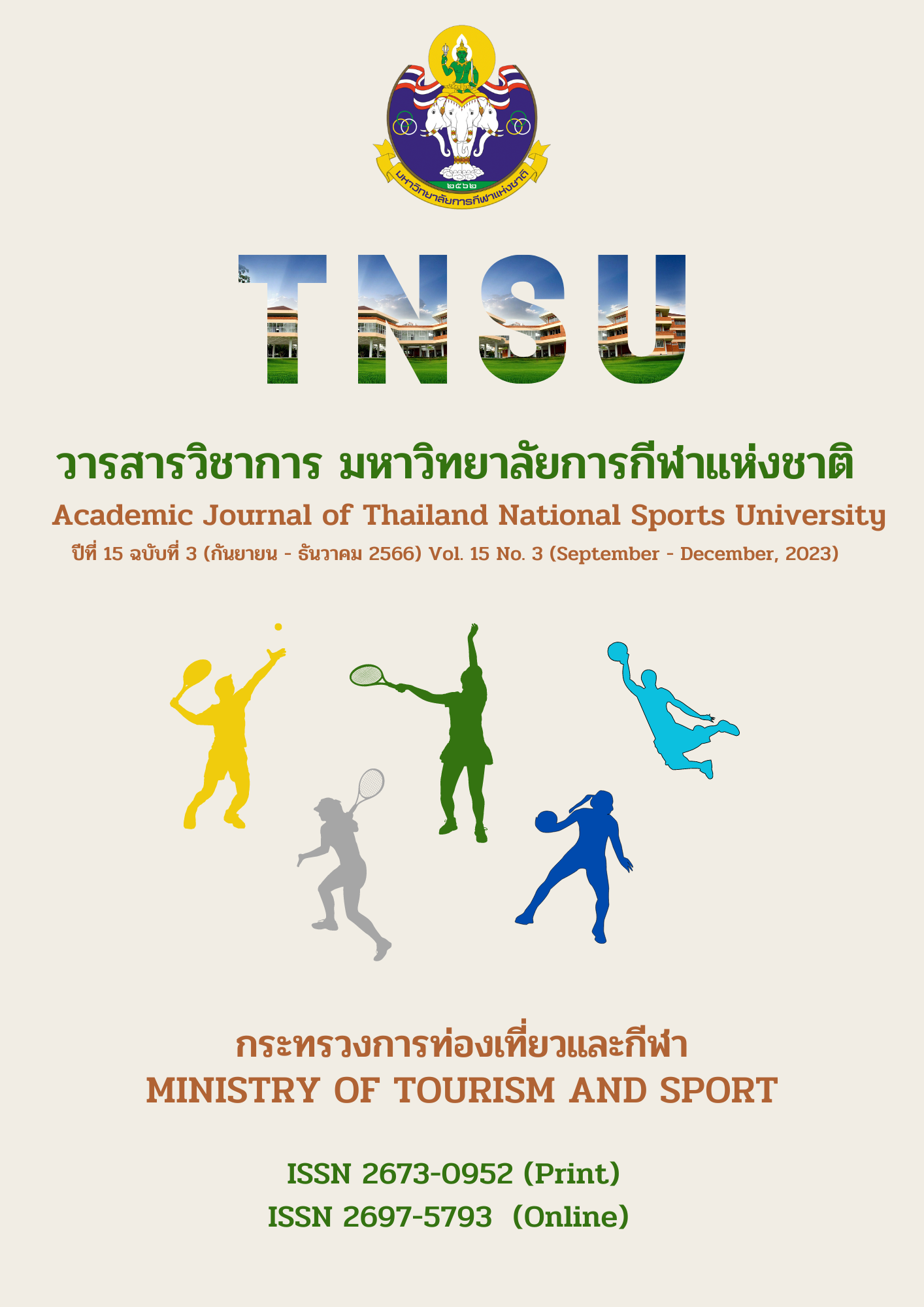THE LEARNING OUTCOMES OF PHYSICAL EDUCATION STUDENTS ACCORDING TO THAI QUALIFICATIONS FRAMEWORK IN ONLINE LEARNING FOR HIGHER EDUCATION, THAILAND NATIONAL SPORTS UNIVERSITY
Main Article Content
Abstract
The purposes of this research are to study and to compare the opinions on student learning outcomes according to Thailand National Higher Education Qualifications Framework, through online study of students in the Bachelor of Education Program in Physical Education, Thailand National Sports University. The population of this research was 7,803 students majoring in Physical Education at the Faculty of Education, Thailand National Sports University, Academic Year 2022: and 384 samples from 17 campuses across the country were obtained by using a simple random sampling method, 2 campuses per region, totaling 8 campuses in all regions and set the sample proportion equally to get 48 students per campus. The instrument for collecting data is a questionnaire consisting of 6 areas, specifically: 1) morality and ethics 2) knowledge 3) cognitive skills 4) interpersonal skills and responsibility 5) numerical analysis, communication and information technology skills and 6) learning management skills. The data were analyzed to calculate frequency, percentage, mean, standard deviation using both one-way ANOVA and Scheffe methods.
Results indicated as follows: 1) The opinions on learning outcomes according to the National Qualifications Framework for Higher Education in the online learning of students in the Bachelor of Education Program in Physical Education, Thailand National Sports University, are in each and every aspect of the 6 qualitative levels, at a high level of satisfaction and learning outcomes; 2) The opinions on learning outcomes according to the National Qualifications Framework for Higher Education in online learning among students in Bachelor of Education Program in Physical Education, Thailand National Sports University among campuses in specifically the North and Northeast part of Thailand differ significantly from the Central Region at the .05 level.
Article Details

This work is licensed under a Creative Commons Attribution-NonCommercial-NoDerivatives 4.0 International License.
The published article is a copyright of the Academic Journal of Thailand National Sports University. The passage appeared in each article in this academic journal is a perspective of each author which is not related to the journal. Each author is required to be responsible for all components of his/her own article. If there are any mistakes, each author must be responsible for those mistakes on his/her own.
References
Charinya Samanyat. (2021). Desirable characteristics of teaching students Thailand National Sports University Chaiyaphum Campus for Thai Qualifications Framework for Higher Education. Journal of Education, 15, 45 - 56.
Chinawat Kaiket, Natchajarn Rodwattanditsakul, Prakorn Tuisry, Patara Yantarakorn, & Thachakorn Pukamarn. (2022). The learning outcomes of physical education students according to Thai Qualifications Framework for Higher Education, Chiang Mai University. Journal of Humanities and Social Sciences University of Phayao, 9(1), 56 - 78.
Education Council Secretariat. (2017). Manual for Internal Education Quality Assurance Higher Education, 2014 (4th ed.). Bangkok: Parbpim.
Ministry of Education. (2009). Announcement of the Ministry of Education on Qualifications Framework for Higher Education, 2009. Bangkok: Ministry of Education.
Government Gazette. (1999). National Education Act 1999, Vol. 116, chapter 74, 1 - 23.
Siranee Intaranongpai, & Juthamart Kotchakot. (2017). The learning outcome under the qualifications framework for higher education (TQF) in Community Nursing Practicum Subject, Bachelor of Nursing Science. Journal of The Police Nurses, 9(2), 104 - 114.
Taro Yamane. (1973). Statistics: An introductory analysis. New York: New York: Harper & Row.
Uthai Khongiaem, & Payao Netpracha. (2019). State and problems of activity management in relation to the policy, ‘Moderate Class, More Knowledge’, in schools under Nakhonpathom Primary Service Area Office 1. Academic Journal, 8(1), 25 - 39.
Wittaya Wayo, Apiradee Charoennukul, Chatsuda Kankaynat, & Junya Konyai. (2020). Online learning under the COVID - 19 epidemic: Concepts and applications of teaching and learning management. Regional Health Promotion Center 9 Journal, 14(34), 285 - 298.


